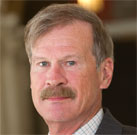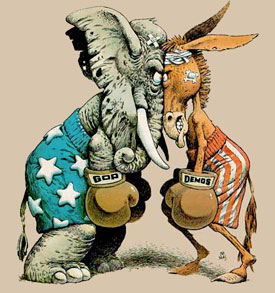In the afterglow of last weekend’s gathering of Porchers, which featured a panel on American exceptionalism, a piece by Walter McDougall over at the Foreign Policy Research Institute’s website comes at a good time. (Is there ever a bad one to skewer hubris and recover modesty?) Nightmares of an I.R. Professor is a somewhat autobiographical account of McDougall’s frustrations with conservatives (especially the neo- variety) and includes the following:
My own new status as a pariah became painfully obvious in Spring 1999 when I addressed The Philadelphia Society on the subject “The Crusader State in the 21st Century.” Joking that they asked me to speak about something I hoped would not exist in an era that had not yet begun, I used the occasion to draw spooky parallels between contemporary American interventionists and Medieval popes! Both could make geopolitical arguments on their behalf: the Crusades, after all, were a long-delayed counteroffensive against Arab jihads. But both promoted forms of “assertive multilateralism” on behalf of “regime change” in hopes of solidifying and sanctifying their home fronts while forcibly exporting their civilization. But pious intentions did not prevent the crusading knights from wreaking death, destruction, and havoc at ruinous cost, including collateral massacres of non-combatant Muslims, Jews, and Greek Orthodox Christians. Worse still, the Crusades became a self-perpetuating, transnational, political-economic system justified by “the revolutionary idea that Christendom had an intrinsic right to extend its sovereignty over all who did not recognize the rule of the Roman Church.” With high irony I suggested the audience substitute America for Church and Democracy for Christianity to imagine how our modern crusaders could spawn perpetual war for perpetual peace—like Oceania in George Orwell’s 1984—and exhaust their own countries in the process.[15] Much of the audience gave my talk a standing ovation, but an angry minority did not. Some were devout Catholics who took offense that I would liken Urban II to the sleazy Clinton! The rest appeared to be earnest young Straussians in whose neoconservative Weltanschauung my Burkean conservatism was heresy.
I see now that during that otherwise halcyon decade I was living Cassandra’s curse. Consider my November 1999 keynote address at the Foreign Policy Research Institute’s annual dinner on the subject of “America and the World at the Dawn of a New Century.” I was loath to spoil the festive mood by speculating about future threats such as “nightmarish visions of failed states, famines, ethnic violence, financial meltdowns, rogue states with nuclear weapons, terrorism on American soil, an angry Russia, a threatening China, and a unified Europe becoming a competitor.” So instead I emphasized neither contingencies nor ends and means, but assets. Looking ahead, what national assets must the United States husband, augment if possible, and take care not to squander? My list was as follows: (1) a strong economy susceptible only to mild recession; (2) robust armed forces boasting technical superiority and high morale designed for winning wars; (3) presidential leadership that is prudent, patriotic, and persuasive; (4) a bipartisan, internationalist consensus in Congress; (5) sturdy regional alliances; (6) engagement to promote balance of power in Europe, East Asia, and the Middle East; (7) strong Pan-American ties to secure of our southern border.
Just take them away, one by one, I suggested, and try to imagine the United States advancing its goals of security, stability, prosperity, and human rights. “You can’t do it. A U.S. economy in reverse, a weak or demoralized military, a floundering president, a divided, partisan Congress, a crack-up of our alliances, an Asia gripped by wars cold or hot, with China or Russia checking U.S. diplomacy at every turn, or an America fixated on tensions with the Hispanic world: if only one or two of these conditions exist, then America’s sermons and sanctions will suffice to control very little indeed.”
During the 2000 campaign there was reason to hope that George W. Bush and his foreign policy team shared my conviction that the goal of conservatives is to conserve, as in “first do no harm.” They spoke of humility, warned of the “mission creep” plaguing foreign interventions, and eschewed nation-building. But the shock of the 9/11 attacks and the imperative duty to prevent their repetition caused the Bush administration to launch two wars for regime change that eventuated in costly, bloody occupations belatedly devoted to democratizing the whole Middle East. Thus did the United States squander in only five years all seven of the precious assets listed in my 1999 speech. When the other shoe dropped—not another Al Qaeda attack but the 2008 sub-prime mortgage collapse—Americans wrestled anew with an inconvenient truth. Foreign enemies cannot harm the United States more than Americans harm themselves, over and over again, through strategic malpractice and financial malfeasance.












Apparently someone hates America . . .
It is one of the more durable folkways of the alcoholic, this current bipartisan infatuation with the daftly named “neo-conservatism”. It used to be constrained to primarily foreign policy arms projection and so left us marginally intact. Now, the besotted creed of babbling prevaricators infests our economic system as well and so we might venture a new motto:
“Yea….you think you’re tough? Well, watch as I kick my own ass”.
We’ve been kicking our own ass for a couple decades now and some like to talk of recovery. It is simply a lull between applications of a tired kick.
Comments are closed.